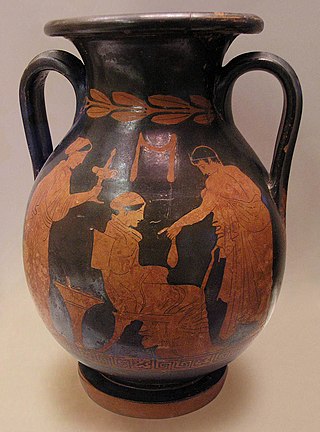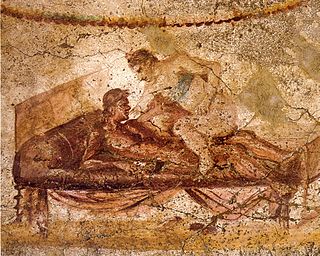
Nevada is the only U.S. state where prostitution is legally permitted in some form. Prostitution is legal in all but 7 of Nevada's 17 counties, although only six allow it in every municipality. Seven counties have at least one active brothel, which mainly operate in isolated, rural areas. The state's most populated counties, Clark and Washoe, are among those that do not permit prostitution. It is also illegal in Nevada's capital, Carson City, an independent city.

A brothel, bordello, ranch, or whorehouse is a place where people engage in sexual activity with prostitutes. However, for legal or cultural reasons, establishments often describe themselves as massage parlors, bars, strip clubs, body rub parlours, studios, or by some other description. Sex work in a brothel is considered safer than street prostitution.

Prostitution in the Netherlands is legal and regulated. Operating a brothel is also legal. De Wallen, the largest and best-known Red-light district in Amsterdam, is a destination for international sex tourism. From 1 January 2022, a customer will be punished if they purchase a sexual service from a sex worker of whom they know or have serious reason to suspect that there is coercion, exploitation or human trafficking.
The Eliza Armstrong case was a major scandal in the United Kingdom involving a child supposedly bought for prostitution for the purpose of exposing the evils of white slavery. While it achieved its purpose of helping to enable the passage of the Criminal Law Amendment Act 1885, it also brought unintended consequences to its chief perpetrator, W. T. Stead.

Male prostitution is the act or practice of men providing sexual services in return for payment. It is a form of sex work. Although clients can be of any gender, the vast majority are older males looking to fulfill their sexual needs. Male prostitutes have been far less studied than female prostitutes by researchers. Even so, male prostitution has an extensive history including regulation through homosexuality, conceptual developments on sexuality, and the HIV/AIDS, monkeypox, and COVID-19 epidemic impact. In the last century, male sex work has seen various advancements. Popularizing new sexual acts, methods of exchange, and carving out a spot in cinema. Today, there is a focus on improving the work conditions, treatment, and mental health of male sex workers.

In Great Britain, the act of engaging in sex as part of an exchange of various sexual services for money is legal, but a number of related activities, including soliciting in a public place, kerb crawling, owning or managing a brothel, pimping and pandering, are illegal. In Northern Ireland, which previously had similar laws, paying for sex became illegal from 1 June 2015.

Prostitution is illegal in the vast majority of the United States as a result of state laws rather than federal laws. It is, however, legal in some rural counties within the state of Nevada. Prostitution nevertheless occurs elsewhere in the country.

Prostitution was a common aspect of ancient Greece. In the more important cities, and particularly the many ports, it employed a significant number of people and represented a notable part of economic activity. It was far from being clandestine; cities did not condemn brothels, but rather only instituted regulations on them.
Prostitution in Ireland is legal. However, since March 2017, it has been an offence to buy sex. Third party involvement is also illegal. Since the law that criminalises clients came into being, with the purpose of reducing the demand for prostitution, the number of prosecutions for the purchase of sex increased from 10 to 92 between 2018 and 2020. In a report from UCD's Sexual Exploitation Research Programme the development is called ”a promising start in interrupting the demand for prostitution.”

Zwi Migdal was an organized-crime group by Polish Jewish individuals, founded in Poland and based mainly in Argentina, that trafficked in Jewish women from Central Europe for sexual slavery and forced prostitution.
Prostitution in Singapore in itself is not illegal, but various prostitution-related activities are criminalized. This includes public solicitation, living on the earnings of a prostitute and maintaining a brothel. In practice, police unofficially tolerate and monitor a limited number of brothels. Prostitutes in such establishments are required to undergo periodic health checks and must carry a health card.

Prostitution is the business or practice of engaging in sexual activity in exchange for payment. The definition of "sexual activity" varies, and is often defined as an activity requiring physical contact with the customer. The requirement of physical contact also creates the risk of transferring diseases. Prostitution is sometimes described as sexual services, commercial sex or, colloquially, hooking. It is sometimes referred to euphemistically as "the world's oldest profession" in the English-speaking world. A person who works in this field is called a prostitute, or more inclusively, a sex worker.
Prostitution in Egypt is illegal. The Egyptian National Police officially combats prostitution but, like almost all other countries, prostitution exists in Egypt. UNAIDS estimate there to be 23,000 prostitutes in the country, including Egyptians, West African and Eastern Europeans.

Prostitution in ancient Rome was legal and licensed. In ancient Rome, even Roman men of the highest social status were free to engage prostitutes of either sex without incurring moral disapproval, as long as they demonstrated self-control and moderation in the frequency and enjoyment of sex. Brothels were considered a popular place of entertainment for Roman men, and it was undoubtedly a part of the culture of ancient Rome. At the same time, the prostitutes themselves were considered shameful: most were either slaves or former slaves, or if free by birth relegated to the infames, people utterly lacking in social standing and deprived of most protections accorded to citizens under Roman law, a status they shared with actors and gladiators, all of whom, however, exerted sexual allure. Some large brothels in the 4th century, when Rome was becoming officially Christianized, seem to have been counted as tourist attractions and were possibly state-owned. There were two types of sexual slavery: patronage and prostitution. Prostitutes had to pay a tax, where patronages did not, though it was deemed more acceptable to be the latter.
Charlotte Hayes was a highly successful brothel keeper in early Georgian London, and the owner of some of the city's most luxurious brothels in and around King's Place, in St James's.

Prostitution has been practiced throughout ancient and modern culture. Prostitution has been described as "the world's oldest profession" although the oldest professions are most likely farmers, hunters, and shepherds.

Fanny Murray, née Fanny Rudman and later Fanny Ross, was an 18th-century English courtesan, mistress to John Montagu, 4th Earl of Sandwich and dedicatee of the fateful Essay on Woman (1763) that led to the downfall of John Wilkes. A contemporary of Kitty Fisher and Charlotte Hayes, the "celebrated Fanny Murray" was one of the most prominent courtesans of her day; a celebrity and fashion leader who rose from destitution to wealth and fame, before settling down into a life of "respectable prosperity". The Memoirs of the Celebrated Miss Fanny Murray are one of the first examples of the "whore's memoir" genre of writing, although they are unlikely to have been actually written by Murray.
The British Overseas Territories (BOT) or alternatively, United Kingdom Overseas Territories (UKOTs), are 14 territories under the jurisdiction and sovereignty of the United Kingdom. They are the parts of the British Empire that have not been granted independence or have voted to remain British territories. These territories do not form part of the United Kingdom. Most of the inhabited territories are internally self-governing, with the UK retaining responsibility for defence and foreign relations. The rest are either uninhabited or have a transitory population of military or scientific personnel.

The history of prostitution in France has similarities with the history of prostitution in other countries in Europe, namely a succession of periods of tolerance and repression, but with certain distinct features such as a relatively long period of tolerance of brothels.

Prostitution in early modern England was defined by a series of attempts by kings, queens, and other government officials to prohibit people from working in the sex industry. There was an ebb and flow to the prohibition orders, which were separated by periods of indifference at various level of the English government. Areas like Southwark that had cultivated a reputation as a hub for prostitution and entertainment, originally outside of the jurisdiction of London, were incorporated into the city during the early modern period. Some illicit businesses in these areas continued to offer their services to interested patrons more discretely, but many brothels and related businesses reemerged in less conspicuous areas of London, disguised as other kinds of businesses.














